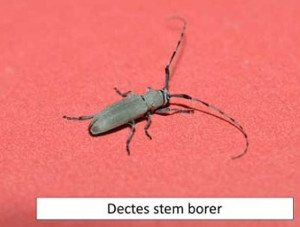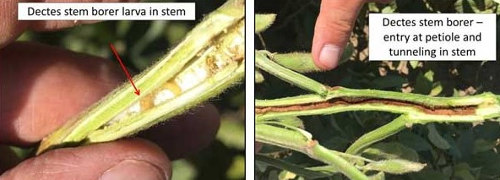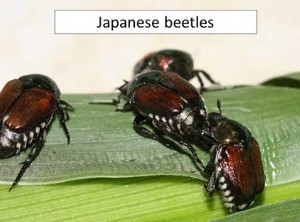By Jeff Whitworth & Holly Davis
Dectes stem borer adults continue to emerge throughout north central Kansas (Figure 1). These adults are currently aggregating mainly around field borders and most commonly on ragweed. They will start dispersing into soybean fields within the next week to 10 days, as they do every year, to begin oviposition. The adult females are relatively mobile and move from plant to plant inserting eggs into, or just below, the petioles of many plants. This oviposition period may last for four weeks or more and may be spread throughout the field! This is one reason why controlling dectes stem borers with an insecticide is so difficult – timing of application.


Figure 1. Examples of dectes stem borer adult, larva, and entry point.
Eggs hatch in the stem and the small larvae start feeding/boring their way to the main stem and then down this stem to the soil surface. They usually reach the soil line in late August and larvae girdle their way around the inside of the stem, weakening the stem and often leading to lodging, especially if there are strong winds. This lodging is responsible for most of the yield loss. For more information regarding dectes stem borers, please see the KSRE publication “Dectes Stem Borer”, MF2581: https://www.bookstore.ksre.ksu.edu/pubs/MF2581.pdf
For more information on soybean pest management, please refer to the K-State Soybean Insect Management Guide at: https://www.bookstore.ksre.ksu.edu/pubs/MF743.pdf
Japanese Beetles
Japanese beetle adults have also been emerging over the past week or two (Figure 2). These adults will feed on just about any pollen, nectar, or succulent plant source for a few days then disperse to begin ovipositing into the soil. The adults may attack emerging silks in corn or new succulent leaves in soybeans, but typically only around the edges of fields.

Figure 2. Japanese beetles on a corn plant.
Source: ksu.edu